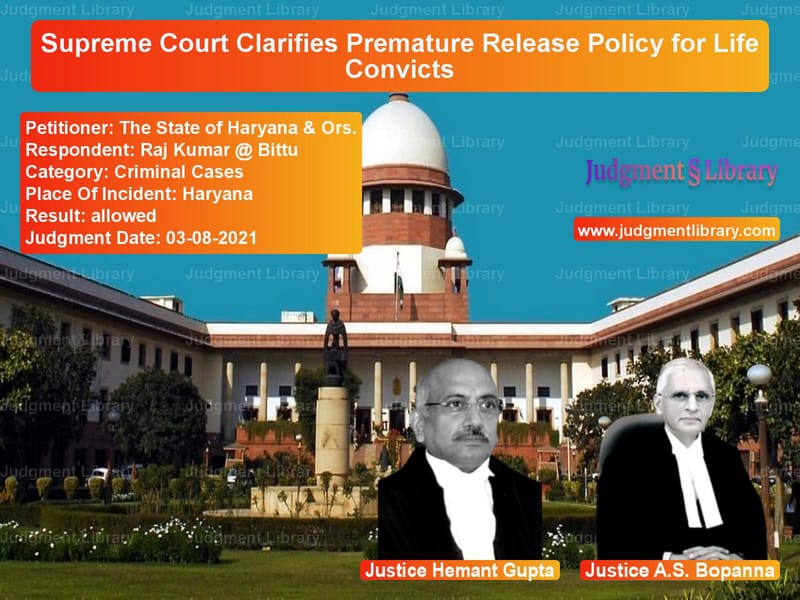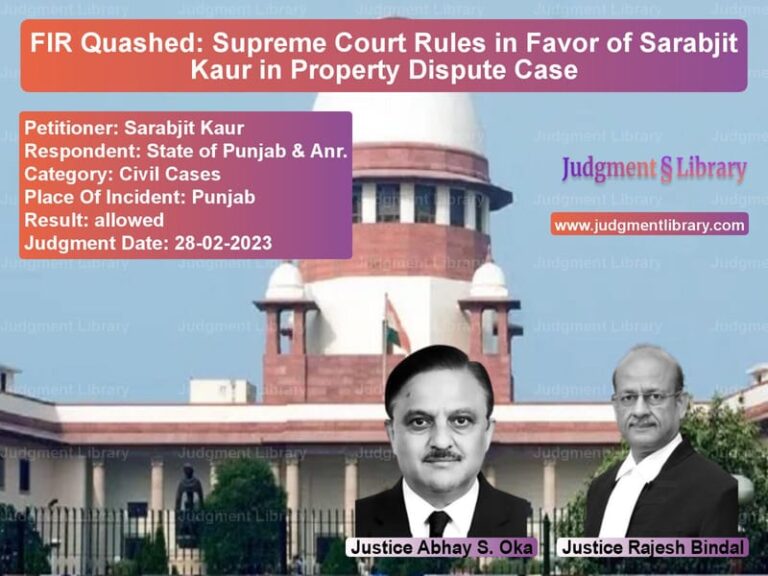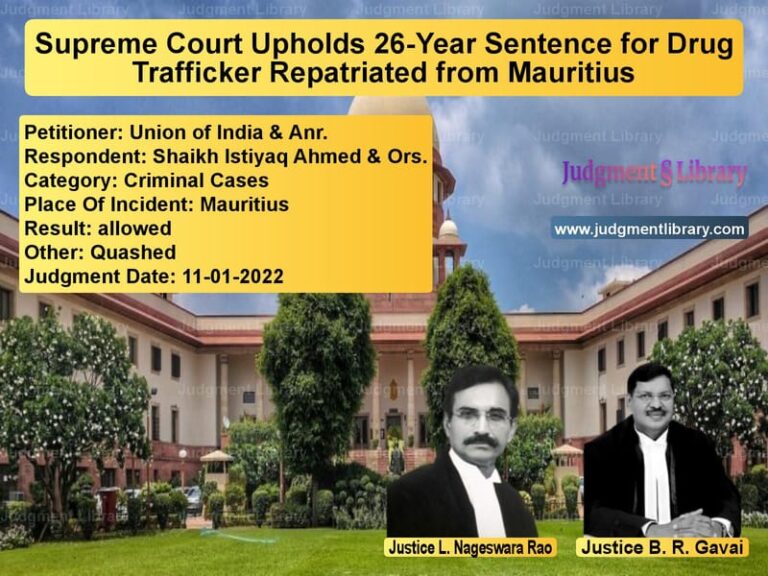Supreme Court Clarifies Premature Release Policy for Life Convicts
The case of The State of Haryana & Ors. v. Raj Kumar @ Bittu revolves around the interpretation of premature release policies for life convicts. The Supreme Court examined whether a prisoner convicted in 2010 should be considered for premature release under the 2002 remission policy or the subsequent 2008 policy issued by the Haryana Government. The ruling clarified the distinction between remission policies framed under the Code of Criminal Procedure (CrPC) and the constitutional powers of the Governor under Article 161.
Background of the Case
Raj Kumar, the respondent, was convicted on 25 March 2010 for an offense punishable with life imprisonment. The legal issue before the Supreme Court was whether the prisoner’s premature release should be considered under the 2002 policy, which was in force at the time of conviction, or the 2008 policy, which was later introduced by the Haryana Government.
The dispute arose because the High Court of Punjab and Haryana, through an order dated 12 May 2020, directed the Haryana Government to reconsider its remission policies and provide clarity on the application of powers under Article 161 of the Constitution and Sections 432 and 433 of the CrPC. The High Court also suggested retrospective application of remission policies, provided they did not lead to discrimination among prisoners.
Key Issues Raised
- Whether remission policies should apply as per the date of conviction or the date of consideration for premature release.
- Whether the Governor’s power under Article 161 is separate from remission policies framed under CrPC.
- Whether Section 433-A of CrPC, which requires life convicts to serve at least 14 years before release, overrides state remission policies.
Petitioner’s Arguments
The State of Haryana contended that:
- The policy dated 13 August 2008 had superseded all previous remission policies, including the 12 April 2002 policy.
- As per the 2008 policy, a convict sentenced to life imprisonment could only be considered for premature release after completing at least 14 years of actual imprisonment and a total of 20 years with remissions.
- The High Court’s direction to frame retrospective remission policies was against established legal principles.
- The power under Article 161 is discretionary and should not be interfered with by the courts.
Respondent’s Defense
Raj Kumar’s counsel argued that:
- Since the 2002 remission policy was in force at the time of his conviction, his case should be considered under that policy.
- The 2002 policy allowed life convicts to be considered for release after completing 10 years of actual imprisonment.
- The High Court correctly observed that remission policies should be framed with retrospective effect to avoid discrimination.
- Remission is a statutory right, and the State should not arbitrarily deny it.
Supreme Court’s Ruling
The Supreme Court ruled that:
- The policy prevailing at the time of conviction should be applied for considering remission.
- The power under Article 161 of the Constitution, which allows the Governor to grant pardons and remissions, is independent of remission policies framed under CrPC.
- Section 433-A of CrPC imposes a mandatory requirement for a life convict to serve at least 14 years before being considered for remission unless released under Article 161.
- The High Court’s direction to frame retrospective remission policies was not legally sustainable.
Key Observations from the Judgment
The Supreme Court emphasized:
“The power under Article 161 is distinct from remission granted under CrPC. The Governor acts on the aid and advice of the State Government, and remission policies framed under CrPC cannot curtail this constitutional power.”
Further, the Court stated:
“The remission policy applicable at the time of conviction should govern the prisoner’s case. Retrospective application of remission policies may lead to inequality among convicts.”
Final Judgment
The Supreme Court allowed the appeal and ruled that:
- The remission policy in force at the time of conviction (2002 policy) should be applied.
- The High Court’s directions to reconsider remission policies were set aside.
- The prisoner must serve at least 14 years of actual imprisonment before being considered for release unless granted remission under Article 161.
Impact of the Judgment
This ruling provides clarity on the application of remission policies and reinforces the principle that remission should be considered based on the policy in force at the time of conviction. Key takeaways include:
- Remission policies framed under CrPC cannot override the Governor’s constitutional power under Article 161.
- Convicts must serve a minimum of 14 years before being eligible for remission under Section 433-A of CrPC.
- Retrospective application of remission policies is not legally permissible.
Conclusion
The Supreme Court’s decision in The State of Haryana & Ors. v. Raj Kumar @ Bittu reinforces the principles of consistency and fairness in remission policies. The ruling ensures that remission is granted based on policies applicable at the time of conviction and prevents arbitrary application of new policies. This judgment serves as an important precedent for remission cases across India.
Petitioner Name: The State of Haryana & Ors..Respondent Name: Raj Kumar @ Bittu.Judgment By: Justice Hemant Gupta, Justice A.S. Bopanna.Place Of Incident: Haryana.Judgment Date: 03-08-2021.
Don’t miss out on the full details! Download the complete judgment in PDF format below and gain valuable insights instantly!
Download Judgment: the-state-of-haryana-vs-raj-kumar-@-bittu-supreme-court-of-india-judgment-dated-03-08-2021.pdf
Directly Download Judgment: Directly download this Judgment
See all petitions in Bail and Anticipatory Bail
See all petitions in Judgment by Hemant Gupta
See all petitions in Judgment by A. S. Bopanna
See all petitions in allowed
See all petitions in supreme court of India judgments August 2021
See all petitions in 2021 judgments
See all posts in Criminal Cases Category
See all allowed petitions in Criminal Cases Category
See all Dismissed petitions in Criminal Cases Category
See all partially allowed petitions in Criminal Cases Category







